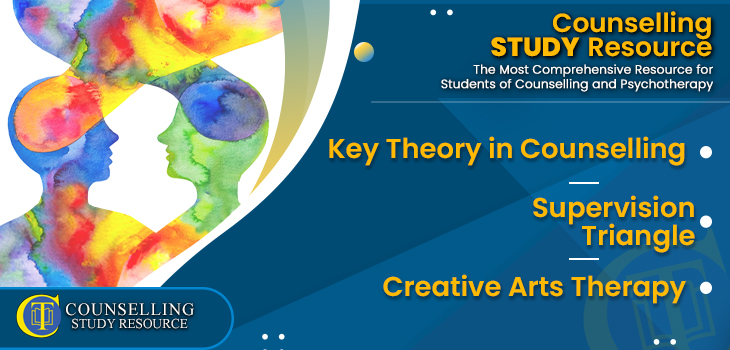192 - The Supervision Triangle
Key Theory in Counselling – Creative Arts Therapy
In episode 192 of the Counselling Tutor Podcast, presenters Rory Lees-Oakes and Ken Kelly talk in ‘Student Check-In’ about key theory in counselling. Then – in the first instalment of ‘Focus on Supervision’ – Ken and Rory talk about the supervision triangle. To end, in ‘Practice Matters’, Rory talks to counsellor and trainer Ani de la Prida about working with creative arts therapy.
Key Theory in Counselling (starts at 1.30 mins)
Understanding counselling theory can be tricky, coming as it does with a whole new language. And as a student of counselling or psychotherapy, you need to be able not only to understand the theory but also to write about it in assignments and apply it to practice.
Different modalities are based on different theories, and some take longer to train in than others. But, as Ken points out, there is – despite these different theoretical underpinnings – some commonality between modalities, with different words sometimes representing similar concepts across modalities. Thus, while the words may differ, the ideas behind them may well overlap.
Rory has prepared a handout for you on this important area of counselling training. Entitled ‘Counselling Theory – Trigger Vocabulary: Cheat Sheet’ (though there’s no actual cheating involved in using a plain-English summary of keywords of counselling-speak!), you can download this here.
The Supervision Triangle (starts at 16.05 mins)
If you are already a qualified supervisor, do you need any additional training to be able to supervise counsellors who are working online? Ken and Rory’s answer is a resounding ‘Yes!’ from a professional and ethical standpoint.
In ‘Focus on Supervision’, this new regular slot in the Counselling Tutor Podcast, Ken and Rory begin by talking about the supervision triangle.
The supervision ‘triangle’ refers to the three cornerstones of clinical supervision:
- normative – ensuring that the practitioner (supervisee) is practising in line with the ethical standards of their professional body
- formative – looking at the learning and development of the supervisee, identifying any needs in this respect and encouraging the supervisee to fill them
- restorative – supporting the supervisee to look after themselves in a way that fosters their own wellbeing and personal development
Ken and Rory talk through each of these three cornerstones, providing examples to illustrate them. While they may not be obvious to the supervisee, the skilled supervisor is constantly reviewing and balancing these three areas of focus.
And in the very middle of this triangle stands ethics, reflecting the whole raison d’etre of clinical supervision.
Counselling Tutor has been working hard over the last year – led on this project by Rory – to develop a level 6 certificate in online supervision.
This will allow:
- qualified counsellors to upgrade to online working
- counsellors who are ready to train as supervisors to do so with a specialisation in online working
The course is mapped to the supervision competences set by ACTO, the British Association for Counselling and Psychotherapy (BACP) and the National Counselling Society (NCS). You can read more about it on the Counselling Tutor website.
Creative Arts Therapy (starts at 28.45 mins)
Using creative arts in counselling is a topic that arises often in the Counselling Tutor Facebook group. If you aren’t already a member, do come along and join over 37,000 students, qualified practitioners, tutors and supervisors interested in the world of counselling and psychotherapy.
Rory talks with Ani de la Prida, who is a psychotherapist, creative arts counsellor, and lecturer at the University of East London. She also founded the Association for Person Centred Creative Arts.
Their conversation covers a range of points regarding this interesting way of working, including:
- the difference between person-centred art therapy and using creative arts in a therapeutic setting
- protected titles and associated restrictions
- how creative arts can enhance therapeutic effectiveness
- the impact of creative arts on relationship development
- the importance of sensitivity
- non-directivity in creative arts, and the risk of harm to clients through directivity
- what types and presentations of the client might particularly benefit from creative arts therapy


